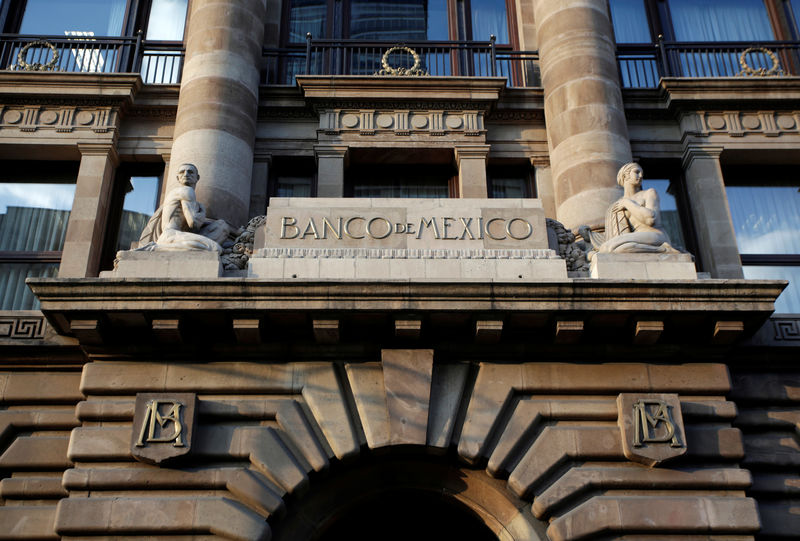By Sharay Angulo and Anthony Esposito
MEXICO CITY (Reuters) - The Mexican central bank's surprise interest rate cut on Thursday is likely to have a limited impact at best on lifting growth this year after the sluggish economy narrowly avoided recession in the first half of 2019, analysts say.
By a 4-1 decision, the Bank of Mexico's five-member board voted to lower its key lending rate by 25 basis points to 8.0%, the first cut since June 2014, after the economy grew 0.1 percent in the second quarter and contracted in the first.
The bank, often known as Banxico, cited slowing inflation and increasing slack in the economy, fueling expectations that further monetary policy easing could be on the way with key economic indicators struggling to make headway.
"Whatever we do now on the monetary policy front doesn't work for this year in terms of growth," said Sergio Kurczyn, a senior economist at bank Citibanamex. "It can work on inflation, exchange rates, but on growth it's no use."
It would likely take more than a year for rate cuts to have a significant economic impact, Kurczyn added.
The financial system is generally slow to pass on cuts, and most Mexicans do not have direct access to banking, said Jose Luis de la Cruz, chief economist at the IDIC think tank.
Still, Mexican President Andres Manuel Lopez Obrador hailed the interest rate cut, saying it would stimulate Latin America's second-largest economy.
Since the start of the year, the median forecast for 2019 Mexican growth in Banxico's monthly poll of private sector economists has fallen steadily, and now stands at 0.8% - less than half the expansion predicted at the end of last year.
Banxico said in a post-meeting statement that "slack conditions in the economy have continued to loosen, even more than expected, widening the negative output gap" and that the balance of risks for growth "remains tilted to the downside."
A lower interest rate in an economy with a free-floating exchange rate, such as Mexico's, can help boost growth by fueling consumption and borrowing. But it needs time.
Some analysts argue that to stimulate domestic consumption, rates would need to be cut by at least 100 basis points.
"Maybe if Banxico lowers it 200 basis points, there might be a difference. Credit card rates could be back at 18%," said James Salazar, an analyst at CI Banco.
Rates of interest charged on a typical credit card average around 30% in Mexico, almost double that of the United States.
Moreover, the effect on consumption of cheaper bank lending is limited in a country in which over 60% of the population is not banked, according to World Bank data.
"To the extent that bank lending to the private sector is relatively low as a share of (gross domestic product), this lessens the spur to economic activity from lower borrowing costs," said Charles Seville, co-head of Latin America sovereigns at ratings agency Fitch.
Asked in an interview with Reuters whether the rate cut would help boost growth, Bank of Mexico Governor Alejandro Diaz de Leon avoided making such a link.
Instead, he said the cut was aimed at "better aligning" borrowing costs with inflation, which has been declining.
He noted that global trade tensions could weigh on growth in Mexico, an economy especially reliant on exports and imports, but said that "other internal elements" could be better suited to fostering economic activity, without elaborating.
In a bid to rev up the lackluster economy, the government unveiled a $25 billion stimulus package last month.
"Historically the transmission of monetary policy to the real economy in Mexico tends to be quite weak," said Edward Glossop, Latin America economist at Capital Economics.

"The government's recently announced fiscal stimulus will be more important in driving growth over the coming quarters."